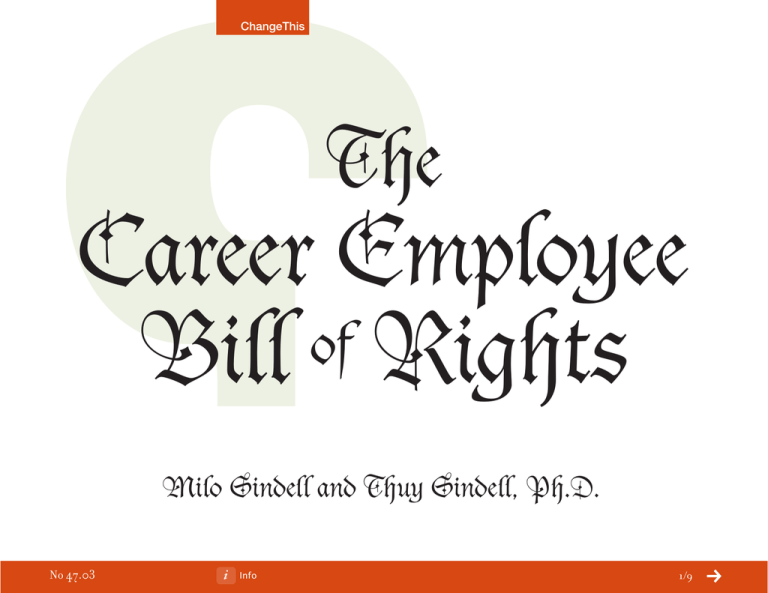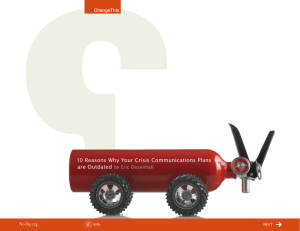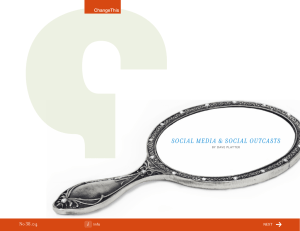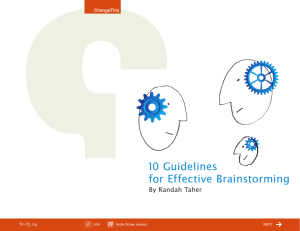Career Employee Bill Rights The
advertisement

ChangeThis The Career Employee of Bill Rights Milo Sindell and Thuy Sindell, Ph.D. No 47.03 Info /9 ChangeThis Are you a career employee? A career employee is an individual who spends their career working as part of a company, as opposed to working for their own company. Don’t get us wrong. There is no judgment here. There’s absolutely nothing wrong with being a career employee. Working as part of a company affords a certain level of safety, comfort, and stability balanced with the potential for fantastic opportunities (Think pre-IPO Google employees). Although entrepreneurship is often glamorized, very few of us—by nature of our personality— are actually designed to venture out on our own and brave the world of starting, funding, and managing our own enterprise. Popular culture simplifies the glory of the entrepreneur and the ease and liberation of creating a four hour work week simply by starting your own business. Trust us, we know personally—We have both worked for other companies and started our own. It can be a challenging road and it’s not for everyone. That’s not just because it’s tough; sometimes being an entrepreneur may not reflect your strengths, personal goals, and what actually drives you. So, many of us choose to become career employees. No 47.03 Info /9 ChangeThis As a career employee, have you ever really sat down to think about your rights as an employee? We don’t mean your rights as governed by the federal, state, and local government. We mean your rights to make the most of your potential and the opportunities within the places where you pursue your career. Why would something like an Employee Bill of Rights even matter? Gallup estimates 71% of employees are not “engaged” on the job. This means that on most days in many companies, a majority of employees aren’t really giving it their all. One seemingly obvious explanation would be that people just don’t want to work, but that would be incorrect. Research over the last 60 years shows that over 70% of the population would still work even if they had “won the lottery.” So why do so many people want to work, but are not engaged with the particular work they’re doing at the moment? The disconnect between job satisfaction and the desire to work is due to the feeling that our time and energy is spent fulfilling the goals and dreams of others. The result is a tremendous number of disengaged employees, and billions of dollars in lost productivity and employee turnover. In the past, an employee’s relationship with their job was about work/life boundaries. Today, and in the future, work is and will be an integral expression of who you are. More than ever before, people need resources that will give them a framework to organize their ideas, skills, tools and sources of motivation to take control of their job and discover what’s in it for them. Enter the Career Employee Bill of Rights. These are not the rights afforded to you by the law. These are your eight inalienable rights, and unfortunately, no one has made it clear that you have these rights. Discover what each of these mean to you and take action to make these rights yours. Then, live them every day of your working life and professional career. No 47.03 Info /9 ChangeThis Right # 1 You have the right to take advantage of your job and employer. At various points during our employment and career, we find that we’ve let our employers take advantage of us: passed over for promotions, a surprise downsizing, a managers who takes credit for work you’ve done. Why is it that the opposite is not true? Make your job work for you. That’s what the Bill of Rights affords you. Most of us are not taking advantage of the situation. Ask yourself “What’s in it for me?” What are the opportunities in your current job you are not taking advantage of that will make you more marketable in the job market? What knowledge, skills, and training are you missing out on? You have the right to get what you need from your job, and we mean more than just a paycheck. Right # 2 You have the right to only give as much as you can. Why do we feel like we need to give more than our fair share? What are we trying to prove? Staying up until 2am to do work is not proving anything to your employer except that you can’t effectively do your work during the work day. Give as much as you can during normal business hours. After that, it’s not necessary unless you are taking off early to go to kid’s softball game. Even then, work for a few hours in the evening to make it up, but not until 2am. Demand of yourself what you would expect of others; and lead by example. No 47.03 Info /9 ChangeThis Right # 3 You have the right to roam. Just because your job dictates that you need to get a certain amount of work done, it doesn’t mean that you are not allowed to leave your cubicle or office. We are social creatures. Get up and walk around, if not to get some fresh air, then at least to catch up with coworkers. Networking is an important part of the job. When was the last time you chatted it up with a coworker? Does your company make you feel that it’s not okay to take a break to get refreshed, or that those hallway conversations are a waste of time? You never know how those seemingly unrelated conversations can suddenly have relevance down the road or help to create rapport that pays off later. Take the time to be social. Right # 4 You have the right to the truth. If you are being judged at the end of every review period (and paid your bonus based on your performance) you have the right to demand feedback on a regular basis—not just at the end of the year. If your boss is afraid of giving you feedback because he or she is not skilled, is conflict avoidant, or doesn’t make the time, you will suffer the consequences of their ineffectiveness. Don’t be their victim. Take the initiative to ask for the feedback. Otherwise it will never happen. Make sure you take notes and document your meeting as well, because later on, if you get a bad review, you have documentation of asking regularly for feedback and not getting it. Take charge of getting the information you need to thrive in your job. No 47.03 Info /9 ChangeThis Right # 5 You have the right to enjoy your work. Your work does not have to be an unrewarding chore you wake up to every day. If you dread going to work, that’s your fault. Take a moment to stop and think about what you’ve done to get yourself into this situation. What do you need to do differently? Do you need to change your attitude about work, your behaviors at work, or get trained in some new skills to feel stimulated? Or, are more drastic measures necessary, such as getting yourself off of a dreadful project, changing jobs within the company to do something else for another team or department, or leaving the company altogether? What will get you up out of bed every morning with a smile? Suffering is optional. Turn your work into something you enjoy. You deserve it. Right # 6 You have the right to more. Who wants to be stuck in a dead end job? If you feel like your current role is not stimulating or challenging you, you have the right to say something about it and change it. Don’t wait around for your manager to shine the light on this situation. He or she is probably very clear that it is a dead end situation, but somebody’s got to do the job; and if you’re not going to complain about it, why should they rock the boat either? The only caveat to be aware of is that your current role, while not challenging you to grow, may be the right place for now due to other things going on in your life that require your attention as well. So the timing may be such that it’s just fine for now, but you know that long-term, you will likely want more. Ask yourself on an ongoing basis, “What’s in it for me?” No 47.03 Info /9 ChangeThis Right # 7 You have the right to leave an inspiring legacy. Whether or not you’ve been aware of it, you have been leaving a legacy in every place you’ve worked. Whether that legacy is intentional or inspiring is another issue. Why leave it to chance? Everyone wants to be proud of their work, but that doesn’t always translate into actions and behaviors that support that goal. Take a look at your current projects and role. What positive impact, whether it’s a process or documentation, can you leave behind that will not only make you feel good, but you know you can brag about to your friends and colleagues? Your legacy is a reflection of your contribution to, and impact on, the people and companies for whom you have worked. Make it count. Right # 8 You have the right to fire your employer. As a Career Employee, when all else fails, you have the right to terminate the relationship with your company. Long days spent in a miserable job will only slowly kill your spirit. God forbid you end up exhibiting health issues as a result of your job (and, we’re not talking about your standard occupational hazards from which OSHA protects you), such as ulcers, sleep deprivation, or weight gain and all the other conditions that result from it. Life is too short. If you are clearly in an unhealthy situation and you’ve tried everything you can to make it better, it’s time to get out. As a Career Employee you will have many jobs, and perhaps careers, within your life-time. You have the right to fire those jobs and companies that are simply not a “good match.” No 47.03 Info /9 ChangeThis These are your Career Employee Bill of Rights. They are rights you have as a person who chooses to work for another individual. It’s up to you whether you want to use your rights. But, keep in mind that your employer exercises their rights every day you work for them. To keep things fair, you in turn need to exercise your rights. The more you exercise your rights, the more work will feel like a place where you can thrive and look forward to going to every day. Make the choice and experience your work on your terms. No 47.03 Info /9 ChangeThis info About the AuthorS Milo Sindell and Thuy H. Sindell, Ph.D. are founders of Hit The Ground Running, an employee performance software company. They are also the authors of Sink or Swim: New Job. New Boss. 12 Weeks to Get it Right (Adams Media, May 2006) and Job Spa :12 Weeks to Refresh, Refocus, and Recommit to Your Career (Adams Media, April 2008). Milo has worked for Intel and Sun Microsystems providing expertise in change management, knowledge management, and employee engagement. Thuy has provided leadership consulting and coaching to Fortune 500s. They have been featured in BusinessWeek, CNN Money, Fortune, Forbes, The Washington Post, and on NBC. Visit www.HitTheGroundRunning.com for more information. send this Pass along a copy of this manifesto to others. buy the book Get more details or buy a copy of the authors’ latest book, Job Spa. Subscribe Sign up for our free e-newsletter to learn about our latest manifestos as soon as they are available. Born on date This document was created on June 4, 2008 and is based on the best information available at that time. Check here for updates. ABOUT CHANGETHIS Copyright info WHAT YOU CAN DO ChangeThis is a vehicle, not a publisher. We make it easy for big ideas to spread. While the authors we work with are responsible for their own work, they don’t necessarily agree with everything available in ChangeThis format. But you knew that already. The copyright of this work belongs to the author, who is solely responsible for the content. You are given the unlimited right to print this manifesto and to distribute it electronically (via email, your website, or any other means). You can print out pages and put them in your favorite coffee shop’s windows or your doctor’s waiting room. You can transcribe the author’s words onto the sidewalk, or you can hand out copies to everyone you meet. You may not alter this manifesto in any way, though, and you may not charge for it. ChangeThis is supported by the love and tender care of 800-CEO-READ. Visit us at 800-CEO-READ or at our daily blog. No 47.03 Info This work is licensed under the Creative Commons Attribution-NonCommercialNoDerivs License. To view a copy of this license, visit Creative Commons or send a letter to Creative Commons, 559 Nathan Abbott Way, Stanford, California 94305, USA. Cover image from iStockphoto® /9











